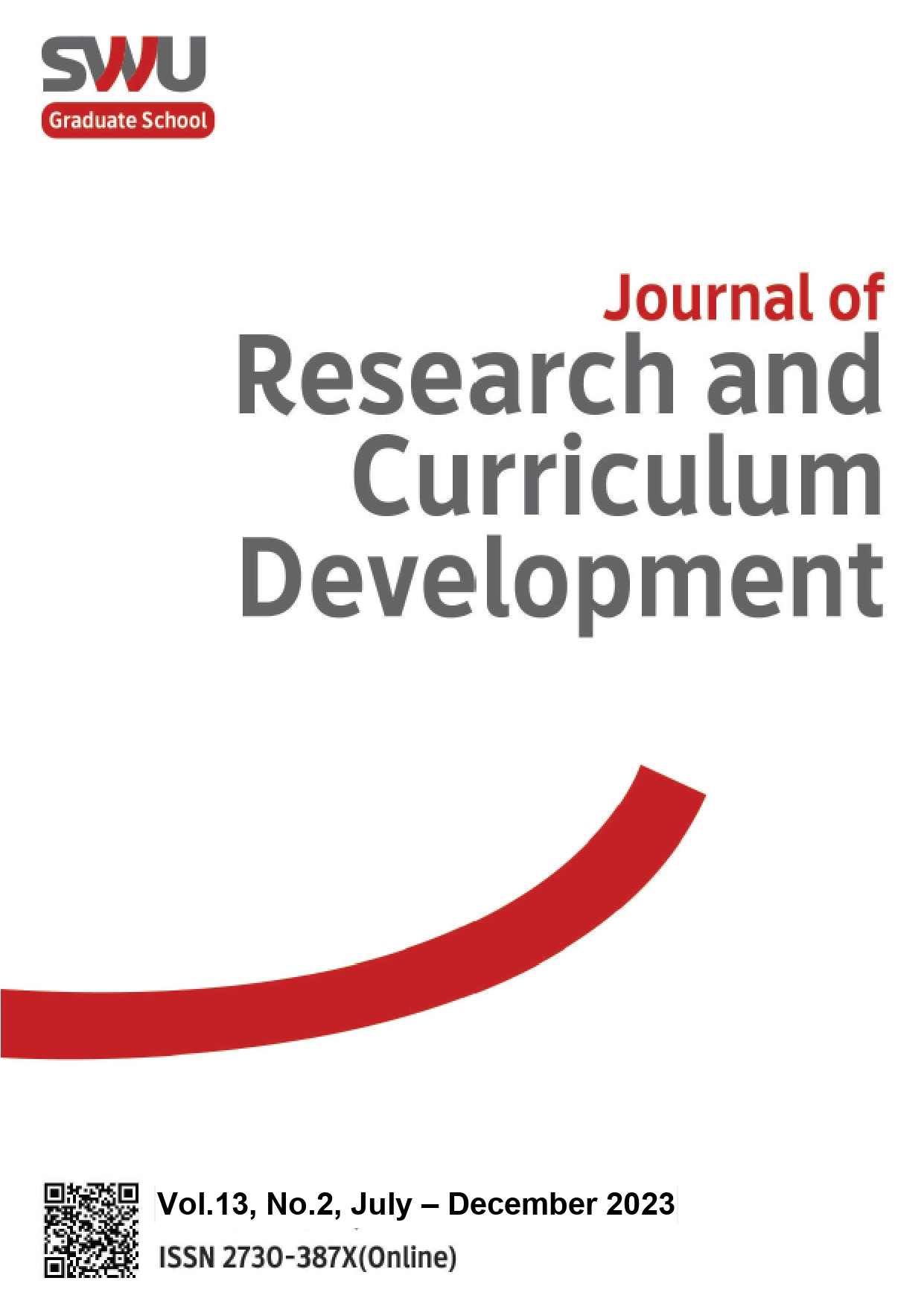Critical Participatory Action Research for Development of Private School Teachers' Work Approaches in Bangkok
Abstract
This critical participatory action research was conducted to develop the work approaches among teachers in a private school in Bangkok. The study was framed around the participatory discipline, as follows (1) explore work problems; (2) study the guidelines of work approaches; and (3) develop the work abilities of teachers. A principal, eight private school teachers, and six researchers were engaged as participants, and divided into two groups: insiders and outsiders. Content analysis was used for data collection with a qualitative approach, such as participatory focus groups, in-depth interviews, document analysis, and action learning were applied. The findings showed that private school stakeholders address the importance of work problems and work management by systematically focusing on the abilities and problem-solving skills and were divided into three dimensions of work problems among private school teachers, e.g., workload problems, work context problems, and work management problems. It also presents that the action learning process can promote abilities and problem-solving skills, collaborative teamwork, and other needed individual skills to achieve the goals of the school. Moreover, the development aims to enhance the abilities of teachers, problem-solving skills, and management from action learning, impacting three stakeholder levels: individual, team, and organization.
References
Aubusson, P., Ewing, R., & Hoban, G. (2012). Action learning in schools: Reframing teachers' professional learning and development. Routledge.
Bahar, A. K., Maker, C. J., & Scherbakova, A. (2021). The role of teachers’ implementation of the Real Engagement in Active Problem Solving (REAPS) model in developing creative problem solving in mathematics. Australasian Journal of Gifted Education, 30(2), 26-39. https://doi.org/10.21505/ajge.2021.0013
Boonruksa, S. (2017). Participatory action research for development of the knowledge management model of school in Muang Pattaya: case study of Muang Pattaya 7 school (Ban nong khae). Phikanatesan, 13(1), 27-42.
Catelli, L. A., Costello, J., & Padovano, K. (2000). Action research in the context of a school–university partnership: its value, problems, issues and benefits. Educational Action Research, 8(2), 225-242. https://doi.org/10.1080/09650790000200119
Creighton, J. L. (2005). The public participation handbook: Making better decisions through citizen involvement. John Wiley & Sons.
Fleming, P., & Spicer, A. (2014). Power in management and organization science. Academy of Management Annals, 8(1), 237-298.
Gillies, R. M. (2011). Promoting thinking, problem‐solving and reasoning during small group discussions. Teachers and Teaching: theory and practice, 17(1), 73-89.
Habermas, J. (1991). The Structural Transformation of the Public Sphere: An Inquiry Into a Category of Bourgeois Society (T. Burger, Trans.). MIT Press.
Jongudomkarn, D. (2014). A volunteer alcohol consumption reduction campaign: participatory action research among Thai women in the Isaan region. Asian Pacific Journal of Cancer Prevention, 15(17), 7343-7350.
Kemmis, S., McTaggart, R., & Nixon, R. (2014). The action research planner: Doing critical participatory action research. Springer.
Klibthong, S., & Agbenyega, J. S. (2022). Assessing issues of inclusive education from the perspectives of Thai early childhood teachers. International Journal of Early Years Education, 30(2), 403-418.
Leavy, P. (2017). Research design: Quantitative, qualitative, mixed methods, arts-based, and community-based participatory research approaches. Guilford Publications.
Marquardt, M. J., Banks, S., Cauwelier, P., & Seng, N. C. (2018). Optimizing the power of action learning: Real-time strategies for developing leaders, building teams and transforming organizations. Nicholas Brealey.
McAllister, M., Venturato, L., Johnston, A., Rowe, J., Tower, M., & Moyle, W. (2006). Solution focused teaching: a transformative approach to teaching nursing. International Journal of Nursing Education Scholarship, 3(1), 1-13.
Mezirow, J. (2000). Learning as Transformation: Critical Perspectives on a Theory in Progress: The Jossey-Bass Higher and Adult Education Series. Jossey-Bass Publications.
Mezirow, J. (2003). Transformative learning as discourse. Journal of transformative education, 1(1), 58-63.
Murniarti, E., Sihotang, H., & Rangka, I. B. (2020). Life satisfaction and self-development initiatives among honorary teachers in primary schools. Elementary Education Online, 19(4), 2571-2586.
Office of the Basic Education Commission. (2018). Annual report 2018. Ministry of Education.
Orgoványi-Gajdos, J. (2016). Teachers’ professional development on problem solving: Theory and practice for teachers and teacher educators. Sense Publishers.
Ozanne, J. L., & Saatcioglu, B. (2008). Participatory action research. Journal of consumer research, 35(3), 423-439.
Park, S.-H., Cho, Y., & Bong, H.-C. (2020). Action learning for community development in a Korean context. Action Learning: Research and Practice, 17(3), 273-291.
Petersen, E., Plowman, E. G., & Trickett, J. M. (2012). Business organization and management. Literary Licensing, LLC. https://books.google.co.th/books?id=IRmMuQAACAAJ
Phuwanon, W., & Prakhu Dhammapissamai. (2018). The development of learning and practice for one stop service of provincial electricity authority personal in Chumphae District Khonkaen Province. Journal of Education, Mahasarakham University, 12(3), 144-156.
Ratanasiripong, P., Ratanasiripong, N. T., Nungdanjark, W., Thongthammarat, Y., & Toyama, S. (2021). Mental health and burnout among teachers in Thailand. Journal of Health Research, 36(3), 404-416.
Robinson Jr, J. W., & Green, G. P. (2011). Introduction to community development: Theory, practice, and service-learning (J. W. Robinson Jr & G. P. Green, Eds.). Sage.
Saisakha, N. (2020). A core competencies enhancement training program for Bangkok Airways personnel using the learning by doing principle. Social Science Journal, 10(3), 691-705.
Samson, P. L. (2015). Fostering student engagement: Creative problem-solving in small group facilitations. Collected Essays on Learning and Teaching, 8, 153-164.
Steinberg, S., & Kincheloe, J. (2010). Power, emancipation, and complexity: Employing critical theory. Power and Education, 2, 140-151. https://doi.org/10.2304/power.2010.2.2.140
Tran, T. T. H. (2009). Why is action research suitable for education? VNU Journal of Foreign Studies, 25(2), 97-106.
Ummah, I. K., & Yuliati, N. (2020). The effect of jumping task based on creative problem solving on students' problem solving ability. International Journal of Instruction, 13(1), 387-406.
Downloads
Published
How to Cite
Issue
Section
License

This work is licensed under a Creative Commons Attribution-NonCommercial-NoDerivatives 4.0 International License.





